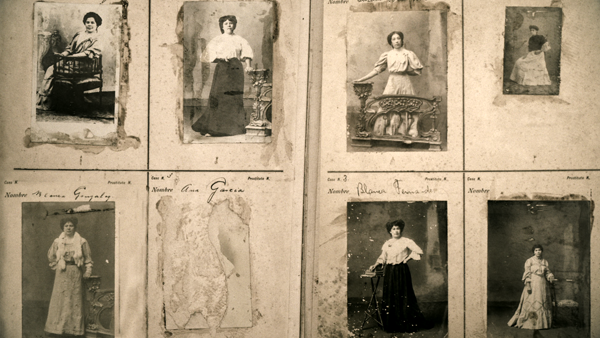
by Amy Stone
At the NY Jewish Film Festival: “The Impure”—Yes, nice Jewish girls and women were prostitutes in Argentina
More timely than ever—think trafficking and violence against women, think Time’s Up‑ “The Impure” (New York Jewish Film Festival Jan. 16) digs into Argentina’s subculture of Jewish prostitutes and pimps in the massive immigration from Eastern Europe starting in the 1880s.

Argentina’s legal prostitution attracted Eastern Europe’s Jewish underworld, riding the wave of 100,000 Jewish immigrants, mostly male. “Impuros” was the term created by the respectable Jews of Argentina to distinguish themselves from the similar-looking immigrants in the sex trade.
What opens as workmanlike documentation–shots of neglected headstones, black-and-white stills of 1880s Buenos Aires, soulful music–gets interesting as the film’s director discovers his own family connections to the sex trade.
Daniel Najenson’s Israel/Argentina 2017 film, in Spanish/Hebrew/Yiddish with English subtitles, truly gets going with the testimony of a former prostitute now a fighter for women’s rights. She’s tough, seemingly fearless, and completely relates to the desperate women who ended up in Buenos Aires brothels over a century ago. “My story is their story.… If they were rich, it was only in semen.”
The grandfatherly Tel Aviv University professor gives a scholarly perspective. The outspoken Argentinian women tell it like it is: The Jewish pimps were let off by “a men’s court” despite thousands of abuse charges from prostitutes. “Today the judicial system is controlled for the most part by men as well.” And we’re treated to some memorable moments in documentary inquiry. With the camera rolling, close-up on his face, the director of Argentina’s Jewish Research Institute (the Buenos Aires branch of YIVO) is still trying to protect the public image of the first- and second-generation immigrants. He tells Najenson, “Let these poor people rest in peace. I’m sick of this morbid curiosity and this intellectual masturbation. I don’t want to stain the memory of the poor women buried in Avellaneda (site of the separate burial site for the impure).”
But the women of Buenos Aires, the former prostitute and respectable Jewish women, have the last words, at least in “The Impure.” One timely insight from the former prostitute: “I think the only way to fight, at least from what I’ve found, is not to hide.”
Also worth seeing: “The Dead Nation” (Tara Moarta)—Romanian filmmaker Radu Jude’s strikingly original time travel back to his native land’s embrace of fascism and bloodlust murder of its Jews. An elegantly simple idea, “The Dead Nation” combines black-and-white photographs from the studio of Costica Acsinte with readings from increasingly desperate entries from the journal of Jewish doctor Emil Dorian and radio broadcasts from 1937 through 1946 with calls to patriotism in the name of Romanian glory and strains of martial music. We gaze on the photos of farmers with their prized cows, joyless children, and men in and out of uniform armed with giant knives or rifles, juxtaposed with the words of the Bucharest doctor stripped of his job, considering suicide, sharing a few grim Jewish jokes, and reporting on Jews suffocating in cattle cars. A rare opportunity to see a rare film. In Romanian with English subtitles, 2017. Screenings January 17 and 21.
Check out the trailers—
“The Impure” trailer https://www.youtube.com/watch?v=nkaPwXjUQHw
“The Dead Nation” trailer https://www.youtube.com/watch?v=dLTdgbLIyc4
###
Details: The 27th annual New York Jewish Film Festival, a partnership of the Jewish Museum and the Film Society of Lincoln Center, runs through Jan. 23 with a wide-ranging selection of international films and Q&A’s with filmmakers.
Screenings at the Walter Reade Theater and the Elinor Bunin Munroe Film Center. NYJFF.org/
The views and opinions expressed in this article are the author’s own and do not necessarily reflect those of Lilith Magazine.